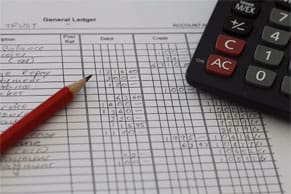Today’s financial controller is not your father’s financial controller. Although the role was once all about math and accounting, now that’s just the baseline. Nowadays, those who excel as controllers also have people, communication and information technology (IT) skills, as well as a knack for strategic planning, business development and business intelligence. And even then, there’s no guarantee of ever being tapped to fill the position above controller: chief financial officer (CFO).
Here’s how to gain the skills and experience needed to become a financial controller — and, if desired, use them as a springboard to move up to CFO.
What Skills Do You Need to Become a Financial Controller
A financial controller’s primary purpose is to oversee how a business spends money and to maintain accurate and timely books and records. But there is considerable nuance in how the role is executed from one organization to another. In larger or more mature companies that typically employ both a controller and CFO, typical core responsibilities for controllers may include:
- Overseeing internal audits to strengthen internal controls and find errors or fraud.
- Owning all financial close processes that lead to generating financial statements and closing the books.
- Maintaining accounting books and records.
- Managing the accounting team’s daily activities.
- Managing monthly, quarterly and annual financial reporting.
- Managing receivables, payables, payroll and the general ledger.
- Monitoring bank balances.
- Approving and coding invoices to ensure reporting accuracy.
- Producing public filings with the Securities and Exchange Commission (SEC).
The controller may also be expected to contribute to:
- Budgeting.
- Developing the business.
- Tax planning.
- Managing cash flow.
- Rolling out ERP, reporting, payroll and other software.
- Evaluating risk.
- Setting prices.
- Preparing financial projections.
- Conducting due diligence during mergers and acquisitions.
- Fostering business partnerships.
In smaller or more entrepreneurial organizations, the financial controller often assumes responsibilities handled by the CFO or other leaders in larger companies. These may include:
- Buying insurance coverage.
- Overseeing public offerings.
- Interacting with lenders and investors.
- Defining customer credit limits.
- Investing pension and surplus funds.
- Making changes to the pension plan.
- Maintaining employee files and other key HR functions.
- Following up with customers.
All told, that long list of responsibilities demands that a person be able to think both strategically and tactically. No wonder, then, that a financial controller must possess a wide range of hard and soft skills, including:
- Accounting skills: Controllers typically have years of accounting and auditing work on their resumes. That experience provides the foundation for data analysis and business intelligence tasks that extend far beyond bookkeeping. They also are generally experts in the intricacies of U.S. Generally Accepted Accounting Practices (GAAP), SEC regulations and International Financial Reporting Standards (IFRS).
- Communication skills: Accounting work often involves reconciling what was budgeted with actual expenses. The ability to explain to stakeholders where those numbers come from — and what they mean — is critical. So is the ability to communicate (and enforce) accounting policies to people outside the accounting department.
- People skills: Many controllers supervise an accounting staff, so they should be able to motivate and develop their staff’s skills. They must also earn the respect and trust of their peers who perform other functions, as well as that of the company’s top leaders. In smaller companies, people skills can be valuable in building strong relationships with suppliers, vendors and other outside entities that are critical to the success of the business.
- Creative-thinking skills: Controllers can add more value to the business by finding new ways to increase accounting and financial efficiencies, boost productivity, simplify processes and automate tasks. When a company is in high-growth mode, a controller plays a critical role in its scaling. All of that demands a talent for looking forward.
- Strategic-thinking skills: Controllers are often asked to set prices and allocate resources (among other things). This requires an understanding about how the data they’ve collected actually impacts the business.
- IT skills: The days are dwindling for controllers who rely on spreadsheets or even basic accounting software. Instead, they more often rely on an enterprise resource planning (ERP) system to build workflows and automate processes that cross several departments.
How Do You Become a Financial Controller?
The need for trained, knowledgeable financial controllers is creating a strong job market. According to the Bureau of Labor Statistics, employment prospects are expected to increase 7% between now and 2030, an increase of approximately 96,000 jobs, with most of those jobs becoming available as current job holders leave the profession or retire. Where will all those new controllers come from? While some may earn a controller title without following any prior, expected career path, those who do will be the outliers: Most upcoming controllers will share backgrounds that include specialized education, certification and years in the trenches. Let’s examine the paths that typically lead to a career as a financial controller.
- Earn a degree.
Most companies require at least a bachelor’s degree from an accredited university in finance, accounting or economics. Experts advise that coursework include accounting, budget analysis, communication, financial management, forecasting auditing and tax law. Many controller positions now also require a master’s degree, typically a Master of Business Administration (MBA). Several universities offer these degree programs online, designed specifically for professionals in the workforce looking to advance in their careers.
Beyond coursework, it’s never too early to begin networking. During college, join accounting or finance clubs, or join the American Institute of Certified Public Accountants (AICPA) as a student affiliate member. Internships offer practical experience.
- Get certified.
Although financial controller jobs now encompass far more than accounting, they still require being adept at managing the books. Earning a certification is a widely accepted way to prove expertise in that area. Arguably the most valuable certification in the field is as a Certified Public Accountant (CPA). To take the test to earn a CPA, candidates need at least 150 hours of post-secondary education and at least two years of professional accounting experience.
Other certifications include:
- Certified Management Accountant (CMA), which prepares people to work in a corporate environment by focusing more on management and executive-level duties (such as budget analysis) and less on accounting tasks (such as preparation of tax returns).
- Chartered Financial Analyst (CFA), which is bestowed by the CFA Institute to certify a financial analyst’s competence. In addition to accounting, CFA exams cover economics, ethics, money management and security analysis.
- Certified Fraud Examiner (CFE), for finance professionals working to combat fraud. Those pursuing this certification will be tested on such topics as law, investigation and fraud deterrence.
- Certified Financial Controller (CFC), which demonstrates mastery of a broad range of financial skills. The 18-part exam includes such topics as long-term debt, dividend policy and multinational finance.
Each of these certifications has merit, but anyone pursuing a financial controller job may want to consider them as additions to earning a CPA. Keep in mind, too, that continuing education credits are a regular requirement for maintaining a CPA license.
- Pay your dues.
No one gets hired as a financial controller right out of school. People have to work their way up the due-diligence ladder, learning skills and gaining experience along the way. To gain that experience:
- Work for one of the Big Four accounting firms (PricewaterhouseCoopers, Deloitte, KPMG or Ernst & Young), if possible, as an accountant or auditor.
- Take a job in a small firm, a startup, the government or a nonprofit. Such jobs may be less prestigious than a job at one of the Big Four (depending on the specific firm), but they still offer valuable broad experience and direct exposure to operations.
- Serve as an assistant controller. Before seeking the top job, plan to gain experience first as a staff accountant and then as an assistant controller. Most assistant controllers have auditing or cost-control backgrounds, and so the expectation is that you’ll spend a minimum of two years (and likely many more) in this role before being qualified enough to be considered for promotion.
- From the outset of this journey, expect to invest 12 to 20 years before landing the controller job. Use that time to build a solid skill set comprising expertise in enterprise-level financial management software and ERP systems; experience with GAAP, IFRS and SEC rules; and top-notch decision-making, problem resolution and creative-thinking skills.
- Stand out.
Every financial controller wants to succeed — and possibly set themselves up for the next career step. As a new financial controller:
- Take charge. To make a difference, make the role proactive, not reactive. Controllers can drive change, always keeping an eye on how a change will pay off for the business, the finance team and their own careers.
- Cut costs. Let’s face it: The controller job is about money, but the role itself doesn’t make money. Still, controllers can benefit a business’s bottom line — they can streamline their departments, automate where possible and keep head count low. They can suggest cost savings for lines of business, too.
- Be aware. As one expert observed, “Visibility is the antidote to risk.” Look around and accurately observe everything. Doing so makes it easier to navigate the shoals of fraud, compliance, controls and obstacles. Then share any observations with the team.
- Avoid groupthink. Being new to the financial controller position affords an opportunity to maintain an “outside” perspective that makes it easier to think outside of the proverbial box and drive change. So hang on to that perspective as long as possible.
- Dump the grunt work. Figure out how to eliminate or automate as much routine work as possible. This will free up more time to think strategically.
Controller to CFO
Now that you’re the financial controller, your next stop is CFO, right? Not necessarily. That leap depends on the size of the organization. In larger companies, the controller typically serves as the CFO’s right hand; in smaller companies, responsibilities are often combined into one role, where the controller:
- Handles most of the basic accounting tasks (like an accountant)
- Collaborates with the CEO (like some financial directors)
- Communicates with banks (like financial managers)
- Manages investor relations (like a CFO)
In larger organizations, the CFO role requires additional skills and, likely, a change in mindset. Whereas a controller is about the numbers, the CFO is about the story behind the numbers. In other words, today’s CFO role looks less like a finance role and more like an operational role. (In fact, many organizations are eliminating the chief operating officer (COO) position and assigning those responsibilities to the CFO.) The question then becomes: How does someone whose only experience has been in finance prepare to take on the responsibilities of a CFO?
- Spend time in operations. Companies are increasingly looking for CFOs with an intimate understanding of how the business actually works and who its customers are. If becoming CFO is the goal, consider stepping off the finance track for a time to run a division of the company.
- Improve communication skills. CFOs are typically the company’s outside face (and voice) to bankers, analysts, investors, ratings agencies and others. Credibility with those entities requires fluency in their languages. And keep in mind, top-notch presentation skills also are critical for pitching ideas and explaining the numbers internally.
- Be ready for the promotion. It’s easy to get caught up in day-to-day tasks, but that may make it harder to move up. Focus on the future and on strategy to develop a long-term perspective.
- Lead an outside project. Is the company implementing a new IT system? Does the company need an accurate sales forecast? Jump at the chance to manage such projects to demonstrate your ability to get the job done. Such projects also offer insights into other parts of the business and can help build strong relationships.
- Get a mentor. Find someone more senior in the organization who is willing to act as a guide and share the spotlight. Observing some of their activities (such as calls with analysts) offers the opportunity to learn how to field business questions when the time comes.
- Act the part. If the goal is to be a C-level executive, start dressing, speaking and acting like those who already are. Show an ability to read a room and adapt.
- Develop empathy. Wait — isn’t HR supposed to be the touchy-feely department? Yes, but experts say successful CFOs are generally disengaged from their own egos. An effective way to accomplish that is to focus on others. Greater empathy will also build tolerance for ambiguity and taking risks.
- Engage with others. It will be tough to succeed as a CFO (or become one) if you’re working on a figurative island. Instead, reach out to other leaders in the organization, tap others as a resource and be available as a resource yourself. Seek candid feedback from peers. Be a dependable team player.
- Get the knowledge you need. Depending on the CFO opportunity in question, specific knowledge may be required. For example, a role in a public company may demand a deep dive into investor relations.
Financial controllers are in demand and will be at least through this decade, according to the BLS. But not just anyone can apply for the position. The road to becoming a financial controller requires dedication, determination and a stellar set of marketable skills. The ideal candidate will follow the path through education, certifications and job experience, all of which can lead to a rewarding career with strong job prospects. The road might even lead to the office of the CFO.
Financial Controller Career Path FAQs
How do you become a financial controller?
To earn a controller title, start with a degree in accounting or finance — and maybe
add an MBA. Next, accrue several years of experience as an accountant or auditor. Finally,
work a stint (at least two years and likely longer) as an assistant controller.
What is the career path for a controller?
Once you become a controller, the next career step may be to assume the same position in a
larger organization or a different industry, or it may be to seek a role as group finance
director or a move to operational finance. With careful planning, it may even lead to CFO.
Can a controller become a CFO?
Yes — but making the transition is not a slam dunk. To have the best chance,
operations experience is necessary. So are polished communications skills and effective team
skills. It also helps to develop empathy in order to be comfortable with ambiguity and
taking risks.
Are financial controllers in demand?
Yes. The profession is expected to expand 7% between now and 2030. That means approximately
96,000 new jobs becoming available in the field over the next decade.









